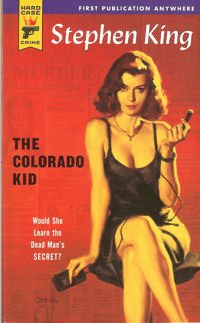Stephen King made headlines a month ago when Hard Case Crime announced that they would be publishing his novel Joyland in June 2013. Joyland is an eagerly anticipated release, but it is not King’s first novel for Hard Case Crime. In 2005, the hardboiled imprint published King’s The Colorado Kid, a short mystery that is by turns charming and puzzling.
The Colorado Kid takes place on fictional Moose-Lookit Island in Maine, a tiny island where Dave Bowie and Vince Teague constitute The Weekly Islander, a small newspaper founded by Vince and now edited by Dave. The third primary character is not the eponymous Colorado Kid, but young Stephanie, The Weekly Islander’s college-age summer intern. We meet the three just after they finish lunch with a Boston Globe reporter by the name of Hanratty. Hanratty is interested in unsolved mysteries, so Dave and Vince trot out a couple of old chestnuts for him.
But the cagey duo doesn’t squander the best stories on outsiders. They reserve the story of The Colorado Kid for Stephanie, as a sign that she is now one of their own. King’s narrative unfolds as the two crusty and garrulous New Englanders recount one of Moose-Lookit’s truly unsolved mysteries.
In April 1980, two local teenagers found a body on the beach. The man had no identification, and seemingly suffocated after a piece of steak lodged in his throat. Vince and Dave take their time detailing the investigation into John Doe’s death and identity, giving Stephanie plenty of opportunity to prove her deductive skills.
Slowly, pieces of the puzzle accumulate. John Doe is the Colorado Kid is James Cogan from Nederland, Colorado. Vince and Dave tease out plausible conjectures for what Cogan might have been doing without a coat on a Maine beach in April, why the non-smoking Cogan had a package of cigarettes with one missing and how the piece of steak got stuck in his throat. Nevertheless, Stephen King’s unconventional narrative prompts at least as many questions as it answers.
The Colorado Kid is long on characterisation, and King’s prose is engrossing. King is intimately familiar with New England types; Dave and Vince are sketched with equal parts love and vivid local flair. This is a charming novella, but may prove somewhat frustrating as a mystery.
The Glen Orbik painting on the cover is gorgeous, but readers will search the book in vain for an alluring character that remotely resembles the bosomy woman in the illustration. The Colorado Kid seems out of place among Hard Case Crime’s other pulp and hardboiled volumes. Tales of ratiocination are not terribly common these days, and were never common in pulpy, hardboiled crime fiction. King repeatedly drops references to Murder, She Wrote, and The Colorado Kid harks back to the type of mysteries more common in the Golden Age: stories about detection, rather than detective stories.
Nevertheless, The Colorado Kid is not entirely a Golden Age tale, either. Stephen King refuses to tie up the mystery neatly, and challenges readers (both implicitly in the novel, and explicitly via an afterword) by leaving so many facets of Cogan’s case unknown to readers or to Vince, Dave and Stephanie. He seems to be aiming for a sort of meta-narrative in The Colorado Kid. The novel is not simply a mystery, but a mystery about mystery – not merely mysteries as a genre, but mystery as the reciprocal of knowledge.
If readers take this view, they may regard the Hard Case Crime imprint and pulpy cover as red herrings rather than inapt. The Colorado Kid is written with verve and tantalising clues. But the philosophic underpinnings of the story make it more than a usual mystery tale. Readers willing to consider Stephen King’s meditations on the nature of knowledge and its inadequacy in explaining life will likely find much to ponder in The Colorado Kid. Those seeking a straightforward genre tale and a bad guy apprehended at the end are likely to be disappointed.
Dorchester Publishing
Print/Kindle
£3.99
CFL Rating: 4 Stars
